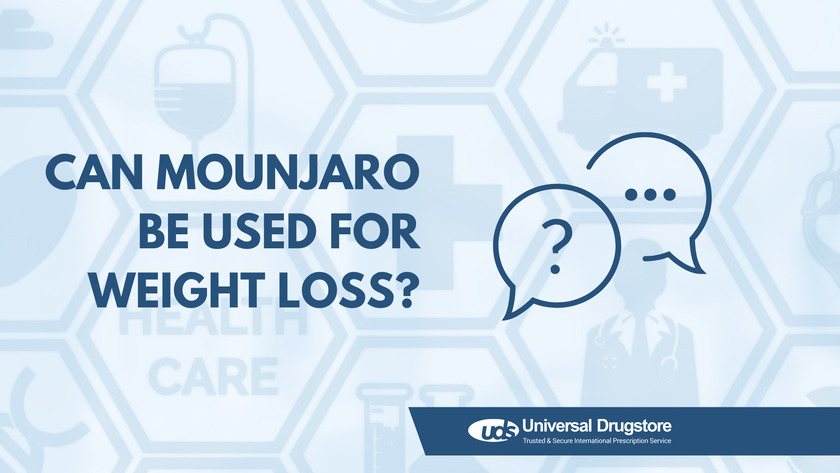According to the Centers for Disease Control and Prevention (CDC), 41.9% of adults in the United States aged 20 and over are considered obese. Obesity is a serious health condition that can lead to heart disease, type 2 diabetes mellitus (T2DM), and certain types of cancer. These complications are among the leading causes of preventable, premature death. Diet, exercise patterns, lack of sleep, and several other factors can be the cause of weight gain and obesity.
The first step you can take to lose weight is to improve your diet, exercise more, and get a good night’s sleep. When this isn’t enough, your healthcare provider may prescribe a diabetes medication such as Mounjaro (tirzepatide) to help you lose weight. Keep reading to find out more about Mounjaro and how it works to help you lose weight.
What is Mounjaro (tirzepatide)?
Mounjaro is a glucose-dependent insulinotropic polypeptide (GIP) receptor agonist as well as a glucagon-like peptide-1 or GLP-1 receptor agonist. It is manufactured by Eli Lilly. The U.S. Food and Drug Administration (FDA) approved Mounjaro along with exercise and a reduced-calorie diet to manage blood sugar levels in adults with T2DM.
The active ingredient in Mounjaro is tirzepatide. It is given as a once-weekly injection given under the skin (subcutaneous) of your stomach, thigh, or upper arm. It is similar to other GLP-1 medications such as Ozempic (semaglutide) and Trulicity (dulaglutide).
Although it has not been approved by the FDA as a weight loss drug, some healthcare providers prescribe the drug for off-label use in the treatment of obesity in patients who do not have T2DM. It is believed that Mounjaro will be approved for weight management in 2023 after it was granted Fast Track designation by the FDA in October 2022.
How does Mounjaro work for weight loss?
Mounjaro works much like other GLP-1 receptor agonists but it has the additional benefit of acting on GIP receptors as well. Mimicking these 2 incretin hormones makes Mounjaro more effective.
In response to food, your gut releases incretin hormones, primarily GIP and GLP-1. They stimulate your pancreas to release insulin while blocking the release of glucagon to help regulate your blood glucose levels. Insulin helps your body absorb sugar from your bloodstream to use for energy. Glucagon is released when your blood sugar is low which causes your liver to break down and secrete stored sugar into your bloodstream.
People who are overweight or obese can become resistant to insulin, which can cause chronic high blood sugar levels. This can lead to weight gain and weight-related complications such as T2DM and heart disease.
So how does Mounjaro help with weight loss? While GLP-1 and GIP increase insulin production, they also target areas of your brain that regulate your appetite after eating. Mounjaro has been shown to slow down how quickly food leaves your stomach, which will make you feel full (satiety) for longer. This will help decrease food intake and increase how much energy you use, leading to the loss of weight and body fat. You will get the best
results from Mounjaro when it is combined with lifestyle changes such as a healthy diet and increased physical activity.
How effective is Mounjaro for weight loss?
While everyone does not lose weight with Mounjaro, a clinical trial during the treatment of people with T2DM showed that participants lost between 5% to 22.5% of their total body weight. This is impressive when compared to FDA-approved weight loss medications such as Saxenda (liraglutide) and Wegovy (semaglutide), whose patients on average lost between 5% to 15% of their total body weight.
Eli Lilly released some preliminary results from its SURMOUNT-1 clinical trial in April 2022. This trial showed that those with obesity or a body mass index (BMI) of 27 or more and at least 1 other comorbidity (not diabetes) lost up to 52 pounds during the 72-week trial. It also showed that the percentage of participants who saw at least a 5% body weight reduction was 85% taking 5mg, 89% taking 10mg, and 91% taking 15mg, compared to just 35% of those taking a placebo.
How much weight can you lose with Mounjaro?
Weight loss on Mounjaro will vary by the dose you take. In one clinical study, people taking 5mg of Mounjaro saw an average weight loss of 16% (35 lbs) of their body weight. Those taking higher doses saw even more weight loss. People taking 10mg lost an average of 21.4% (49 lbs) of their body weight while those taking 15mg lost an average of 22.5% (52lbs). This was compared to the placebo group which only lost 2.4% (5 lbs) of their body
weight over the same amount of time.
How fast do you lose weight with Mounjaro?
You may start to see a decrease in your appetite and some weight loss within a few weeks of Mounjaro treatment but it can take months for some people. The average time it took to see ≥5% weight reduction was 12 weeks for people taking Mounjaro 10mg and 15mg and 16 weeks for those taking Mounjaro 5 mg.
What are some side effects of Mounjaro?
The most common side effects of Mounjaro include:
- Nausea
- Diarrhea
- Decrease appetite
- Vomiting
- Constipation
- Indigestion
- Stomach pain
- Injection site reactions
- Increased heart rate
Mounjaro can sometimes cause serious side effects such as:
- Serious and sometimes life-threatening allergic reactions (hives, swelling of your tongue or throat, and trouble breathing)
- Pancreatitis (inflammation of your pancreas)
- Gallbladder problems including gallstones
- Increased risk of thyroid cancer or thyroid tumors
- Hypoglycemia (low blood sugar levels), especially if taken with other diabetes drugs such as insulin or an insulin secretagogue
- Vision changes
- Kidney damage
These are not all of the possible side effects of Mounjaro. You should always seek medical advice for any questions or concerns relating to your medical condition or treatment. You can report side effects to FDA at 1-800-FDA-1088 or www.fda.gov/medwatch.
What should you tell your healthcare provider before starting Mounjaro?
Before beginning Mounjaro, make sure your healthcare provider is aware of your medical conditions, including:
- Kidney or pancreas problems
- Type 2 diabetes (T2DM) or a history of diabetic retinopathy
- History of severe digestion problems such as slowed emptying of your stomach (gastroparesis)
- Personal or family history of thyroid cancer or multiple endocrine neoplasia syndrome type 2 (MEN 2)
- Are pregnant, plan to become pregnant, or are breastfeeding
What foods should you eat while on Mounjaro?
To get the best results from your weight loss program, Mounjaro should be taken along with a healthy, well-balanced diet and regular exercise. You should avoid processed foods that are high in sugar, cholesterol, and trans fats and replace them with healthier choices such as:
- Lean meats and other foods high in protein, including turkey, chicken, tuna, salmon, and lentils
- Fresh fruits and vegetables
- Whole grains such as quinoa, brown rice, and whole wheat pasta
Talk with your healthcare provider or dietician about a diet and exercise program that may be right for you.
Sources









